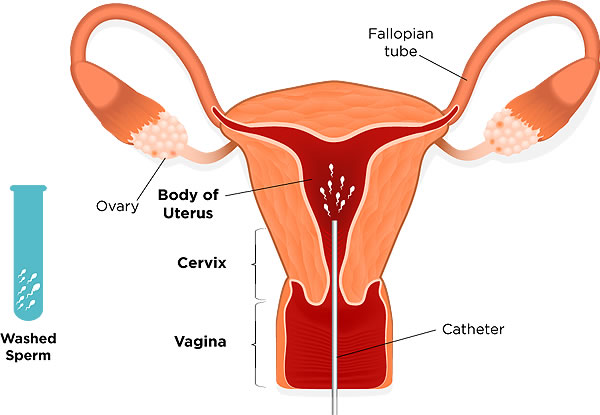
Intrauterine Insemination (IUI)
Intrauterine insemination (IUI) is a form of assisted conception. During IUI, your doctor will place washed, prepared sperm into your uterus (womb) and near to your egg at your time of ovulation. This procedure is often combined with fertility drugs to increase your chances of conceiving.
Could IUI benefit us?
IUI may help you as a couple if:
- Your spouse has a borderline low sperm count or low motility. This is when the sperm’s ability to move is impaired. But there must be enough healthy, motile sperm to make the treatment worthwhile. If not, IVF or ICSI may be more suitable.
- You are unable to have sex because of disability, injury, or if your spouse experiences premature ejaculation.
- You have mild endometriosis.
- You or your spouse’s fertility problems are unexplained.
For IUI to work, your fallopian tubes must be open and healthy. To find this out, you will need to have a tubal patency test. This can be done using laparoscopy, which is a form of keyhole surgery, or a hysterosalpingogram, which is a form of X-ray. These may locate any problems or blockages in your uterus or fallopian tubes.
IUI isn’t recommended if your tubes have adhesions or scarring that might stop an egg travelling from the ovary to your uterus. But if you have at least one working tube and ovary on the same side, IUI may be an option for you.
IUI should not be used in women with blocked fallopian tubes. The tubes are often checked out with an x-ray test called a hysterosalpingogram.
Female age is a significant factor with IUI. Intrauterine insemination has very little chance of working in women over 40 years old. IUI has also been shown to have a reduced success rate in younger women with a significantly elevated day 3 FSH level, or other indications of significantly reduced ovarian reserve.
If the sperm count, motility and morphology scores are quite low, intrauterine insemination is unlikely to work. With significant male factor issues, IVF with ICSI is indicated and has high success rates IUI is commonly used for unexplained infertility. It is also used for couples affected by mild endometriosis, problems with ovulation, mild male factor infertility and cervical factor infertility.
IUI is a reasonable initial treatment that should be utilized for a maximum of about 3 months in women who are ovulating (releasing eggs) on their own. It is reasonable to try IUI for longer in women with polycystic ovaries (PCOS) and lack of ovulation that have been given drugs to ovulate.
How is insemination performed? What is the process for IUI?
- The woman usually is given medications to stimulate development of multiple eggs and insemination is timed to coincide with ovulation – release of the eggs.
- A semen specimen is either produced at home or in the office by masturbation after 2-5 days of abstinence from ejaculation.
- The semen is “washed” in the laboratory (called sperm processing or sperm washing). The sperm is separated from the other components of the semen and concentrated in a small volume. Various media and techniques can be used for the washing and separation. Sperm processing takes about 30-60 minutes.
- A speculum is placed in the vagina and the cervical area is gently cleaned.
- The washed specimen of highly motile sperm is placed either in the cervix (intracervical insemination, ICI) or higher in the uterine cavity (intrauterine insemination, IUI) using a sterile, flexible catheter.
The intrauterine insemination procedure, if done properly, should seem similar to a pap smear for the woman. There should be little or no discomfort.
Most clinics offer for the woman to remain lying down for a few minutes after the procedure, although it has not been shown to improve success. The sperm has been put above the vagina and cervix – it will not leak out when you stand up.
How many IUI to try before doing IVF?
- The short answer is to move on to IVF after 3 failed IUIs
- If the female is age 40 or older, or ovarian reserve low, consider IVF earlier
- In vitro fertilization has a significantly higher success rate as compared to IUI
What is Donor IUI ?
Donor insemination (Donor IUI) uses sperm from a donor to help the woman become pregnant.
Sperm donors are screened for sexually transmitted diseases and some genetic disorders. In DI, sperm from the donor is placed into the neck of the womb (cervix) at the time when the woman ovulates.
Donor – IUI uses intrauterine insemination with donor sperm.
INDICATION FOR USING DONOR SPERM IN IUI
- A male partner with low or no sperm
- ejaculatory dysfunction
- significant male factor infertility (failure of fertilization, male immune disorders or very low count and motility)
- when intracytoplasmic sperm injection (ICSI) is not feasible or elected
- presence of a significant genetic defect or having an affected offspring
- presence of an ineradicable sexually transmissible infection
- severe Rh-immunized female with Rh positive male
- females without partners

